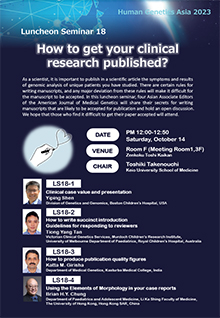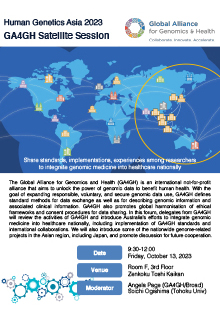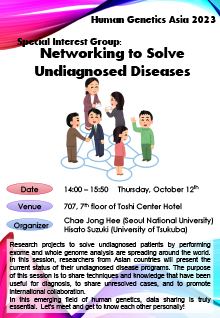プログラム
2023年10月3日時点
プログラム情報は随時更新いたします。
Presidential Lecture
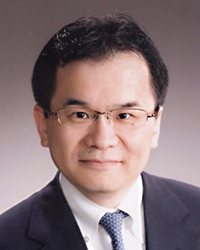
Presidential Lecture
9:20-9:50, Thursday, October 12 (Room A/Cosmos, 3F, Toshi Center Hotel)
Prof. Kenjiro Kosaki
Center for Medical Genetics, Keio University School of Medicine, Japan
Let us treasure and share our exceptions: Story on PDGFRB activating variants
Short Biography
Prof. Kosaki received clinical and research training in pediatrics at Keio University in Tokyo and medical genetics at the University of California, San Diego and Baylor College of Medicine in USA and received board certification in Clinical Genetics from the American Board of Medical Genetics. He is the Founding Director of the Center of Medical Genetics at Keio University. His publications have been referred to in more than 60 of the OMIM database entries spanning diverse areas of medical genetics. Examples include the new syndromic entities identified by his laboratory, namely, the Kosaki Overgrowth Syndrome caused by PDGFRB mutation (OMIM# 616592) and the Thrombocytopenia-Intellectual Disability Syndrome caused by mutation in CDC42 (OMIM# 616737 also known as Takenouchi-Kosaki syndrome). In 2019 he was elected as the President of the Japan Society of Human Genetics and is serving multiple national and international genome research projects in the field of rare and undiagnosed diseases.
Plenary Lectures
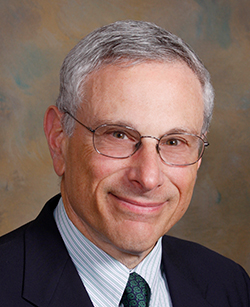
Plenary Lecture 1
13:00-13:50, Thursday, October 12 (Room A/Cosmos, 3F, Toshi Center Hotel)
Dr. Robert L. Nussbaum
Chief Medical Office, Invitae, USA
The expanding role of genetics in the care of patients with rare disorders
Short Biography
Robert L. Nussbaum, MD is Invitae’s Chief Medical Officer. He received his MD from the Harvard-MIT Joint Program in Health Sciences, and internal medicine and genetics training at Washington University and at Baylor College of Medicine. He is a board certified internist, clinical geneticist and clinical molecular geneticist, a Fellow of the American College of Physicians, a Founding Fellow of the American College of Medical Genetics and Genomics and a Past Board Member and President of the American Society of Human Genetics (ASHG). From 2006-2015, he was a Professor of Medicine and Division Chief at the University of California San Francisco (UCSF). Prior to coming to UCSF he was a Branch Chief in the National Human Genome Research Institute from 1993- 2006. He is the co-author of over 400 peer-reviewed publications in human genetics. In 2011, he was given the Klaus Joachim Zulch-Prize for Neurological Research for his work on Parkinson Disease from the Gertrud Reemtsma Foundation/Max Planck Society. In 2015, he was a co-recipient of the ASHG Education Award. He was elected to the National Academy of Medicine (IOM) in 2004 and the American Academy of Arts and Sciences in 2015.
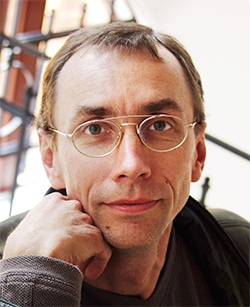
Plenary Lecture 2
13:10-14:00, Friday, October 13 (Room A/Cosmos, 3F, Toshi Center Hotel)
Prof. Dr. Svante Pääbo
Director, Max-Planck Institute for Evolutionary Anthropology in Leipzig, Germany
Adjunct Professor, the Okinawa Institute of Science and Technology, Japan
About Neandertals, Denisovans, and modern humans
*Nobel Prize LaureateShort Biography
Svante Pääbo has developed techniques that allow DNA sequences from archaeological and paleontological remains to be determined. This has allowed the genomes of extinct organisms and ancient humans, animals and pathogens to be studied. His research group has determined high-quality genome sequences from Neanderthals and discovered Denisovans, a previously unknown hominin group in Asia. He has shown that both Neanderthals and Denisovans contributed DNA to present-day humans and that these contributions have physiological and medical consequences today. Pääbo also works on the comparative and functional genomics of modern and archaic humans and apes, particularly the evolution of features that may underlie aspects of traits specific to humans. In 2022, he received the Nobel Prize in Physiology or Medicine.
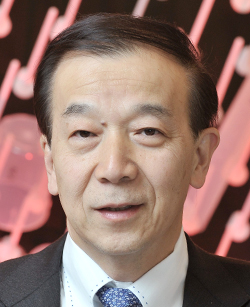
Plenary Lecture 3
9:40-10:20, Saturday, October 14 (Room A/Cosmos, 3F, Toshi Center Hotel)
Prof. Yusuke Nakamura
President, National Institutes of Biomedical Innovation, Health and Nutrition, Japan
40 years of human genetics, genomics, genetic variations and precision medicine
Short Biography
Yusuke Nakamura was graduated from Osaka University School of Medicine in 1977 and spent five years as a postdoctoral fellow and a faculty member at Howard Hughes Medical Institute, the University of Utah. In 1989, he became Head of Biochemistry Department at Cancer Institute, Tokyo. In 1994, he was appointed as Professor at Institute of Medical Science, University of Tokyo and became Director of Human Genome Center in 1995. He also served as director of the RIKEN Center for genomic medicine (2005-2010). In 2011, he was appointed as Special Advisor to the Japanese Cabinet. In 2012, he moved to Department of Medicine at the University of Chicago. In 2018, he returned to Japan as Director of Cross-ministerial Strategic Innovation Promotion Program of Japanese Cabinet Office and then moved as a President, National Institutes of Biomedical Innovation, Health and Nutrition. For his accomplishment, he received many awards that include Medal with Purple Ribbon, Keio Medical Awards, Takeda Medical Award and Clarivate Citation Laureate.
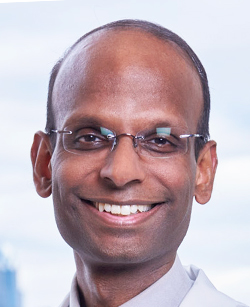
Plenary Lecture 4
10:20-11:00, Saturday, October 14 (Room A/Cosmos, 3F, Toshi Center Hotel)
Prof. Kiran Musunuru
ASHG Board of Directors, Past Program Committee Chair
Therapeutic gene editing for cardiovascular and metabolic diseases:
From the laboratory bench to the clinic
Kiran Musunuru, MD, PhD, MPH, ML, is Professor of Cardiovascular Medicine and Genetics in the Perelman School of Medicine at the University of Pennsylvania. His research focuses on the genetics of cardiovascular and metabolic disease and seeks to identify genetic factors that protect against disease and use them to develop new therapies. He is a recipient of the Presidential Early Career Award for Scientists and Engineers from the White House, the American Heart Association's Award of Meritorious Achievement and Joseph A. Vita Award, the American Philosophical Society's Judson Daland Prize for Outstanding Achievement in Clinical Investigation, the American Federation for Medical Research's Outstanding Investigator Award, Harvard University's Fannie Cox Prize for Excellence in Science Teaching, and the University of Pennsylvania's Jane M. Glick Graduate Teaching Award. He recently served as Editor-in-Chief of the scientific journal Circulation: Genomic and Precision Medicine. He is author of The CRISPR Generation: The Story of the World's First Gene-Edited Babies and Genome Editing: A Practical Guide to Research and Clinical Applications. He is co-founder and Senior Scientific Advisor of Verve Therapeutics.
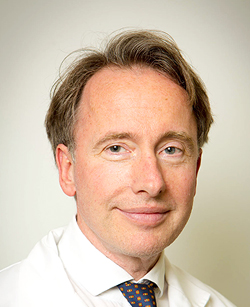
Plenary Lecture 5
11:00-11:40, Saturday, October 14 (Room A/Cosmos, 3F, Toshi Center Hotel)
Prof. Borut Peterlin
Vice President, The European Society of Human Genetics (ESHG)
Innovative approach for implementation of Genomic Medicine in Health Systems
Borut Peterlin is a clinical geneticist, neurologist, and head of the Clinical Institute of Genomic Medicine at the University Medical Center Ljubljana, Slovenia. He is past president and current vice president of the European Society for Human Genetics and chairman of the Professional Committee of the Slovenian Association for Medical Genetics. He was a member of the European Committee of Experts on Rare Diseases (EUCERD) and the Scientific Committee on Health and Environmental Risks (SCHER) at the European Commission. The main focus of his research interest is discovering new genes and mechanisms for human disorders and translating genomic methods into public health systems to improve the diagnostics of rare diseases and translate genomics into personalized medicine.
Translating human genetics and genomics into the future:
Foresights, hurdles and global co-operation
Day 2: Friday, October 13, 2023
2:00pm-4:00pm
Room A/Cosmos, 3F, Toshi Center Hotel
Overview:
Following Professor Pääbo's presentation on human evolution and population genetics, the Global Forum will host a discussion on the future of human genomics. As we learn from ancient DNA, embrace current technological advances, and apply knowledge of human genetics to translational medicine, we also want to take a step forward to anticipate and prepare for a brave new future where genomic technologies and information are accessible to all people in all countries. What would we do then? What would we expect?
Notes:
ASHG:American Society of Human Genetics
ESHG:The European Society of Human Genetics
APSHG:The Asia Pacific Society of Huma n Genetics
EAUHGS:East Asia Union of Human Genetics Society
Wellcome Connecting Science Workshop : Genome Sequence Analysis for Clinical Interpretation
1. Entry for the workshop is free of charge.
2. Registration for HGA2023 is required mandatory to entry.
NOTE: Your entry will be cancelled without notice if your registration is not completed in advance.
Day 1: Thursday, October 12, 2023Timetable
8:30am-12:00pm
2:00pm-5:45pm
Room H, Meeting Room 3&4, 3F, Zenkoku Toshi Kaikan
Day 2: Friday, October 13, 2023Timetable
8:30am-12:00pm
2:00pm-5:30pm
Room H, Meeting Room 3&4, 3F, Zenkoku Toshi Kaikan
Moderator:
Christian Gilissen (Radbound University Medical Center, the Netherlands)
Overview:
This 2 day workshop will be held during the Human Genetics Asia 2023 Conference (HGA2023) on 12 and 13 October 2023 from 8am – 6pm. Participants will be introduced to sequence analysis workflows, key electronic resources and open access tools for variant annotation, interpretation and curation. Case studies will be incorporated to demonstrate key steps in research and potential utility in clinical diagnostics. You will be required to bring your own laptop.
Topics
This workshop focuses on the scientific principles and tools of genomic analysis and interpretation that underpin clinical research and practice and covers the following topics.
- Overview of sequencing technologies for clinical applications
- Sequence analysis workflows
- RNAseq analysis
- Tools for variant interpretation
- Introduction to DECIPHER
- SNV and CNV interpretations
- Variant curation and ACMG guidelines
- Challenges of clinical genomics and ethical
Symposia
Day 1: Thursday, October 12, 2023
10:10am-11:40am, at Toshi Center Hotel
Room A/Cosmos, 3F
SY1: Therapeutics (DNA, mRNA, genome editing, others)
Purpose of the Symposium:
Human genetics is in the midst of a rapid and profound transformation from diagnostics to therapeutics. Let us dive in!
Room B/Orion, 5F
SY2: Cancer Genomics, germline
Purpose of the Symposium:
The role of germline variants in cancer susceptibility genes is increasingly recognized. This is true for both adults and children.
Room C/606, 6F
SY3: Newborn Screening
Purpose of the Symposium:
Newborn screening is a prime example of the contribution of genetics to preventive medicine. Speakers will demonstrate the expansion of newborn screening into inborn errors of metabolism and beyond.
Room D/701, 7F
SY4: COVID-19 Susceptibility
Purpose of the Symposium:
Accurate diagnosis is the starting point for appropriate management of comorbidities and potential treatments. Global efforts to help patients without a diagnosis will be presented. Let us unite.
4:00pm-5:30pm, at Toshi Center Hotel
Room A/Cosmos, 3F
SY5: Pediatric Genetics / Congenital Malformation
Purpose of the Symposium:
Pediatrics is one of the homelands of medical genetics. Consequently, its clinical application is the most advanced. New approaches to the study of birth defects are also presented.
Room B/Orion, 5F
SY6: Cancer Genomics, somatic
Purpose of the Symposium:
Cancer genetics is by far the fastest growing field. New concepts are emerging, including the interplay between germline and somatic variants, intratumor heterogeneity, and tissue-specific oncogenesis.
Room C/606, 6F
SY7: Aging and Diseases
Purpose of the Symposium:
Immortality has long been a theme in Asian cultures. Let us see how much of the variation in human lifespan is determined by our genome.
Room D/701, 7F
SY8: Hemoglobinpathies
Purpose of the Symposium:
Haemoglobinopathies remain the main theme of human genetics in Asia. Recent advances in thalassaemia research will be presented by international speakers.
Day 2: Friday, October 13, 2023
10:10am-11:40am, at Toshi Center Hotel
Room A/Cosmos, 3F
SY9: Omics/ Sequencing Technologies
Purpose of the Symposium:
Historically, human genetics has been heavily dependent on technological advances. This session will discuss new technologies beyond short-read sequencing.
Room B/Orion, 5F
SY10: Prenatal Genetics※日本産婦人科学会 領域講習
Purpose of the Symposium:
Prenatal diagnosis is one of the fastest growing areas in human genetics. Speakers will present developments in various modalities including ultrasound, cell-free DNA analysis and exome analysis.
Room C/606, 6F
SY11: Non-coding Regulatory Elements / ncRNA / miRNA / other RNAs
Purpose of the Symposium:
The regulation of gene expression has been a difficult area of human genetics to tackle. This session will present new successful approaches.
Room D/701, 7F
SY12: Genomic Risk Assessment: Towards Preventive Medicine
Purpose of the Symposium:
Many common diseases are understood to be polygenic. Steady developments in GWAS methodologies and recent advances in polygenic risk scoring have opened the door to a real contribution of genetics to preventive medicine. The speakers will present successful examples.
4:40pm-6:10pm, at Toshi Center Hotel
Room A/Cosmos, 3F
SY13: Databases / Data sharing / Biobank
*SY13 will end at 6:20pm,
Purpose of the Symposium:
As researchers in human genetics, the science of diversity, we rely heavily on variant data, which is the foundation of our diversity. How can we advance our study while protecting privacy? Let's not reinvent the wheel in every country. Let's listen to the wisdom of our predecessors and set global standards. This session is sponsored in part by GA4GH.
Room B/Orion, 5F
SY14: Comprehensive Management of Differences of Sex Development (DSD);
Lessons from Genetics※日本産婦人科学会 領域講習
Purpose of the Symposium:
Differences of sex development is a unique but critically important area of clinical genetics. The topic will be discussed from different perspectives.
Room C/606, 6F
SY15: Bioinformatics
Purpose of the Symposium:
Not a day of geneticists goes by without a good software. Let us leanr new software in this session.
Room D/701, 7F
SY16: Genetics of Complex Diseases
Purpose of the Symposium:
Genetic analysis has become an essential tool in the field of complex diseases, including autoimmune disorders, psychiatric disorders, cardiovascular disorders and beyond.
Day 3: Saturday, October 14, 2023
8:00am-9:30am, at Toshi Center Hotel
Room A/Cosmos, 3F
SY17: Rare and Undiagnosed Diseases
Purpose of the Symposium:
Precised diagnosis is the beginning of appropriate management of comorbidity and trials of potential treatment. Global effort in helping patients without diagnosis willl be presented. Let us unite.
Room B/Orion, 5F
SY18: Ethic, Legel and Social Impleications
Purpose of the Symposium:
As scientists and clinicians at the forefront of technological advances, no one is free from ethical considerations. Is there a single global ethical standard or not?
Room C/606, 6F
SY19: Neurologic Disorders-Diagnostic Perspectives
Purpose of the Symposium:
The field of neogenetics is expanding rapidly. This session will look at diagnostic advances including mosaicism,
repeat expansion and oligonic inheritance.
Room D/701, 7F
SY20: Genetic Counseling 1
1:40pm-3:10pm, at Toshi Center Hotel
Room A/Cosmos, 3F
SY21: Genetic Counseling 2
Room B/Orion, 5F
SY22: Inherited Metabolic Diseases
Purpose of the Symposium:
Inborn errors of metabolism have been the home of human genetics since the era of Garrod. Recent developments in different subfields are illustrated: mitochondrial disorders, adult disorders and therapeutic aspects.
Room C/606, 6F
SY23: Neurologic Diseases-Therapeutic Perspectives
Purpose of the Symposium:
Neogenetics is also expanding rapidly in the therapeutic field. Gene therapy and antisense RNA will be under discussion.
Sponsored Symposium by Myriad Genetics G.K.
Day 1: Thursday, October 12, 2023
1:50pm-3:20pm
Room A/Cosmos, 3F
SS:The large-scale genetic analysis and data sharing in East Asia for hereditary tumors
Chairperson
Mercy Laurino
Fred Hutchinson Cancer Center, USA, University of the Philippines Manila, Philippines
Yoshio Miki
University of Tsukuba Research and Development Center for Precision Medicine, Japan
Speaker
Yukihide Momozawa
RIKEN, Japan
Mercy Laurino
Fred Hutchinson Cancer Center, USA, University of the Philippines Manila, Philippines
Ava Kwong
School of Clinical Medicine, LKS Faculty of Medicine, The University of Hong-Kong, Hong Kong
教育プログラム ※日本語セッション
Day 2: Friday, October 13, 2023
2:00pm-5:30pm
立山(砂防会館 3F)
WebCast ClinicalNotesチャットカフェ
モデレーター:
吉橋 博史( 東京都立小児総合医療センター)
Overview:
日本人類遺伝学会ホームページに掲載されている教育コンテンツであるWebCast で公開されているClinicalNotes の疾患をテーマに、原案者の先生とナビゲーター、参加されるすべてのみなさんが、直接あるいはデバイスを通じてチャットを楽しむカフェを開催します。
お菓子と飲み物、おしゃべりを楽しみながら、スマホを活用した双方向型・参加型セッションとなっています。入退場自由ですので、お気軽にお立ち寄りください。
Day 3: Saturday, October 14, 2023
① 10:50am-11:40am
② 2:30pm-3:20pm
③ 4:10pm-5:00pm
立山(砂防会館 3F)
遺伝医学はじめの一歩-update
モデレーター:
渡邉 淳( 金沢大学)
Overview:
「遺伝医学を基礎から」を学ぶ場を企画しました。この最近の進歩を中心に、①遺伝性疾患、②遺伝子関連検査・染色体検査、③遺伝医療・ゲノム医療の3 部作にしています。皆さんが遺伝医学を整理する機会になると幸いです。
臨床遺伝専門医更新講習
※更新単位取得対象、但し、1つの大会中、最大2単位まで取得可能
Day 1: Thursday, October 12, 2023
Room 1/Yodo-Shinano, 2F, Sabo Kaikan
10:00am-10:50am
教育プログラム1:生殖・周産期領域(1単位)
10:50am-11:40am
教育プログラム2:腫瘍領域(1単位)
2:00pm-2:50pm
教育プログラム3:成人領域(1単位)
2:50pm-3:40pm
教育プログラム4:小児領域(1単位)
Day 2: Friday, October 13, 2023
Room 1/Yodo-Shinano, 2F, Sabo Kaikan
9:30am-10:30am
教育プログラム6-1:臨床遺伝専門医制度委員会単独企画 第1部
10:40am-11:40am
教育プログラム6-2:臨床遺伝専門医制度委員会単独企画 第2部
(合計120分/2単位)
認定遺伝カウンセラー単位講習
Day 1: Thursday, October 12, 2023
Room 1/Yodo-Shinano, 2F, Sabo Kaikan
3:50pm-4:40pm
教育プログラム5-1:認定遺伝カウンセラー単位講習(1単位)
Day 2: Friday, October 13, 2023
Room 1/Yodo-Shinano, 2F, Sabo Kaikan
4:10pm-5:00pm
教育プログラム5-2:認定遺伝カウンセラー単位講習(1単位)
Luncheon Seminars
Day 1: Thursday, October 12, 2023
12:00pm-12:50pm
Room A
LS1: Genomics for Lifelong Health Benefits: Applications in Screening, Diagnosis and Prediction
Sebastian Lunke
Division of Genetics and Genomics at VCGS and the Murdoch Children’s Research Institute in Melbourne, Australia
Twist Bioscience, JAPAN
Day 1: Thursday, October 12, 2023
12:00pm-12:50pm
Room B
LS2: ロングリードRNAシークエンスIso-Seqを用いたヒトの脳の部位間でのトランスクリプトームの比較
嶋多 美穂子
国立国際医療研究センター
トミーデジタルバイオロジー株式会社
Day 1: Thursday, October 12, 2023
12:00pm-12:50pm
Room C
LS3: 周産期疾患とDOHaD研究のいま
菅原 準一
スズキ記念病院
サーモフィッシャーサイエンティフィック
Day 1: Thursday, October 12, 2023
12:00pm-12:50pm
Room D
LS4: ゲノム創薬に向けた 日本人疾患バイオバンク プロテオゲノミクスデータ整備の取り組み
松田 浩一
東京大学大学院 新領域創成科学研究科
オーリンクプロテオミクス株式会社
Day 1: Thursday, October 12, 2023
12:00pm-12:50pm
Room E
LS5: A novel system for human whole-genome structural variation analysis
John Thompson, PhD
Principal Application Scientist, Nabsys, USA
Tateo Nagai
Genomic Bioinformatics, Business Creation Dept. Hitachi High-Tech, JAPAN
Justin Cowling
VP Sales and Marketing, OmniTier, USA
株式会社日立ハイテク
Day 1: Thursday, October 12, 2023
12:00pm-12:50pm
Room G
LS6: 軟骨無形成症の疾患概要と治療薬ボソリチドへの期待
澤井 英明
兵庫医科大学病院 遺伝子医療部・産科婦人科
骨系統疾患の診断と管理 -軟骨無形成症のアップデート-
BioMarin Pharmaceutical Japan 株式会社
Day 2: Friday, October 13, 2023
12:00pm-12:50pm
Room A
LS7-1: Illumina Complete Long Readを使った構造多型参照パネルの検討
岡村 容伸
東北大学 未来型医療創成センター
LS7-2:東北メディカル・メガバンク計画におけるゲノム・オミックス参照パネルの構築
木下 賢吾
東北大学東北メディカル・メガバンク機構
イルミナ株式会社
Day 2: Friday, October 13, 2023
12:00pm-12:50pm
Room B
LS8: PrismGuide™ IRDパネル システムの臨床実装への第一歩
堀田 喜裕
浜松医科大学医学部附属病院 眼科
網膜ジストロフィーの遺伝学的検査
前田 亜希子
神戸市立神戸アイセンター病院研究センター
PrismGuide™ IRDパネル システムの臨床性能
シスメックス株式会社
Day 2: Friday, October 13, 2023
12:00pm-12:50pm
Room C
LS9: ファブリー病のRed Flag症状/所見:治療可能な心ファブリー、女性へテロ患者を見逃さないために
森崎 裕子
榊原記念病院 総合診療部 臨床遺伝科
アミカス・セラピューティクス株式会社
Day 2: Friday, October 13, 2023
12:00pm-12:50pm
Room D
LS10: Critical elements for protecting children from severe genetic disorders at the Genome Medicine era in China.
Yiping Shen
Division of Genetics and Genomics, Harvard Medical School, Boston, USA
MGI Tech Japan 株式会社
Day 2: Friday, October 13, 2023
12:00pm-12:50pm
Room E
LS11: LSLimiting Gene Testing in Cancer Patients Deprives Them of Clinically Useful Information: The Case for Universal Testing
Robert L. Nussbaum
Invitae Corporation, USA
フィンガルリンク株式会社
Day 2: Friday, October 13, 2023
12:00pm-12:50pm
Room G
LS12: SMA(脊髄性筋萎縮症)に関連するテーマ
坊 亮輔
神戸大学大学院医学研究科 内科系講座小児科学分野
中外製薬株式会社
Day 3: Saturday, October 14, 2023
12:00pm-12:50pm
Room A
LS13: ファブリー病における新生児スクリーニングの意義と早期診断の重要性
村山 圭
順天堂大学大学院医学研究科 難治性疾患・治療学/小児科学
サノフィ株式会社
Day 3: Saturday, October 14, 2023
12:00pm-12:50pm
Room B
LS14: 保険収載下のマイクロアレイ染色体検査:実用性と課題
清水 健司
静岡県立こども病院 遺伝染色体科
アジレント・テクノロジー株式会社
Day 3: Saturday, October 14, 2023
12:00pm-12:50pm
Room C
LS15: 遺伝性神経疾患:疾患修飾療法の進歩と遺伝カウンセリング
中村 勝哉
信州大学医学部附属病院 遺伝子医療研究センター 信州大学医学部 脳神経内科、リウマチ・膠原病内科
Alnylam Japan株式会社
Day 3: Saturday, October 14, 2023
12:00pm-12:50pm
Room D
LS16: Oxford Nanopore: a high-precision approach for exploring human disease
Vorasuk Shotelersuk
Center of Excellence for Medical Genomics, Faculty of Medicine, Chulalongkorn University
Thai Society of Human Genetics (TSHG)
Long-read Nanopore sequencing identified D4Z4 contractions in patients with facioscapulohumeral muscular dystrophy
Mari Miyamoto
Oxford Nanopore Technologies, Japan
The high precision of the latest nanopore sequencers and the future of nanopore sequencers.
株式会社オックスフォード・ナノポアテクノロジーズ
Day 3: Saturday, October 14, 2023
12:00pm-12:50pm
Room E
LS17: シーケンスに依らないゲノム異常探索ツール:Optical Genome Mapping
松本 直通
横浜市立大学大学院医学研究科遺伝学教室
アズワン株式会社
Day 3: Saturday, October 14, 2023
12:00pm-12:50pm
Room F
LS18: How to get your clinical research published
Chairperson
Toshiki Takenouchi, Department of Pediatrics, Keio University School of Medicine, Japan
Overview:
As a scientist, it is important to publish in a scientific article the symptoms and results of genomic analysis of unique patients you have studied. There are certain rules for writing manuscripts, and any major deviation from these rules will make it difficult for the manuscript to be accepted. In this luncheon seminar, four Asian Associate Editors of the American Journal of Medical Genetics will share their secrets for writing manuscripts that are likely to be accepted for publication and hold an open discussion. We hope that those who find it difficult to get their paper accepted will attend.
Following topics will be covered:
"Clinical case value and presentation" by Professor Yiping Shen
"How to write succinct introduction" and "advices for responding to reviewers" by Professor Tiong Yang Tan
"How to produce publication quality figures" by Professor Katta M. Girisha
"Using the Elements of Morphology in your case reports" by Professor Brian H.Y. Chung
Yiping Shen
Division of Genetics and Genomics, Boston Children's Hospital, USA
Clinical case value and presentation
Tiong Yang Tan
Victorian Clinical Genetics Services, Murdoch Children’s Research Institute, University of Melbourne Department of Paediatrics, Royal Children’s Hospital, Australia
How to write succinct introduction Guidelines for responding to reviewers
Katta M. Girisha
Department of Medical Genetics, Kasturba Medical College, India
How to produce publication quality figures
Brian H.Y. Chung
Department of Paediatrics and Adolescent Medicine, Li Ka Shing Faculty of Medicine, The University of Hong Kong, Hong Kong SAR, China
Using the Elements of Morphology in your case reports
Notes:
- Lunch box will be served.
- A lunch ticket (free) is needed to attend.
- Please pick one up in advance at the Luncheon Seminar Ticket Desk.
How to Get Your Clinical Research Published <Luncheon Seminar 18>
Day 3: Saturday, October 14, 2023
12:00pm-12:50pm
Room F, 3F, Zenkoku Toshi Kaikan
Speakers:
Yiping Shen (Boston Children's Hospital, Harvard Medical School, USA)
Tiong Yang Tan (Victorian Clinical Genetics Services, Murdoch Children’s Research Institute, University of Melbourne Department of Paediatrics, Royal Children’s Hospital, Australia)
Katta M. Girisha (Sultan Qaboos University, Muscat, Oman and Manipal Academy of Higher Education, India)
Brian H.Y. Chung (Department of Paediatrics and Adolescent Medicine, School of Clinical Medicine, The University of Hong Kong, Hong Kong)
Overview:
As a scientist, it is important to publish in a scientific article the symptoms and results of genomic analysis of unique patients you have studied. There are certain rules for writing manuscripts, and any major deviation from these rules will make it difficult for the manuscript to be accepted. In this luncheon seminar, four Asian Associate Editors of the American Journal of Medical Genetics will share their secrets for writing manuscripts that are likely to be accepted for publication and hold an open discussion. We hope that those who find it difficult to get their paper accepted will attend.
Notes:
- Lunch box will be served.
- A lunch ticket (free) is needed to attend.
- Please pick one up in advance at the Luncheon Seminar Ticket Desk.
Day 3: Saturday, October 14, 2023
12:00pm-12:50pm
Room G
LS19: 希少疾患における多診療科連携の重要性-遺伝専門家が求められていること
古庄 知己
信州大学医学部遺伝医学教室 信州大学医学部附属病院遺伝子医療研究センター 信州大学基盤研究支援センター バイオバンク信州
低ホスファターゼ症に対するMultidisciplinary Approach:
酵素補充療法を導入した小児期発症型成人症例の経験から
西田 佳弘
名古屋大学医学部附属病院リハビリテーション科
NF1診療における多科・多職種連携の重要性;構築と維持における課題と今後の展望
アレクシオンファーマ合同会社 メディカルアフェアーズ本部
Sweet Seminars
Day 1: Thursday, October 12, 2023
4:00pm-4:50pm
Room E
SW1: 希少疾患の遺伝子治療 最近の話題
大石 公彦
東京慈恵会医科大学小児科学講座
これからの新生児スクリーニングにおける遺伝子治療の関わり方
藤波 芳
独立行政法人国立病院機構東京医療センター/臨床研究センター視覚研究部 視覚生理学研究室
遺伝性網膜ジストロフィー(IRD)に対する最新の遺伝学的検査及び遺伝子治療
ノバルティスファーマ株式会社
Day 2: Friday, October 13, 2023
4:40pm-5:30pm
Room E
SW2
上村 泰央
株式会社ジーンベイ
ナノポアシークエンスデータ解析の実際
株式会社ジーンベイ
Medical Bioinformatics Workshop in HGA2023 ※日本語セッション
*Japanese Language is used in this session.
1)参加受付は終了しました。ご応募ありがとうございました。
エントリーはこちらから
2)参加資格:本会への参加登録者
Medical Bioinformatics Workshop in HGA2023-1
Day 2: Friday, October 13, 2023
10:10am-11:40am
707, 7F, Toshi Center Hotel
Medical Bioinformatics Workshop in HGA2023-2
Day 3: Saturday, October 14, 2023
8:00am-9:30am
707, 7F, Toshi Center Hotel
Medical Bioinformatics Workshop in HGA2023-3
Day 3: Saturday, October 14, 2023
1:40pm-3:10pm
707, 7F, Toshi Center Hotel
Other Programs
Special Interest Group (SIG) Sessions
Anybody with interest are welcomed.
We provide “breakout rooms” for groups with special interest in particular topics (e.g., prenatal diagnosis).
Let us get to know each other and develop a collaborative network Asia in your field of expertise.
Speakers and chairpersons of the symposium, oral, and poster sessions have been invited to participate.
Of course, other HGA2023 participants are also welcome.
The format of each session is up to the organizers. Pre-registration is not required to attend.
Call for participation
While pre-registration isn't mandatory, we encourage you to detail your plans through this form to allow session organizers to prepare the necessary facilities.
SIG Sessions
- SIG: Genetic Counseling “Let’s Share Ideas and Opinions on Genetic Counseling!”
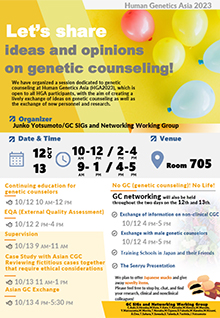
- SIG: Bioinformatics “Bridging Medical Informatics in Asia”
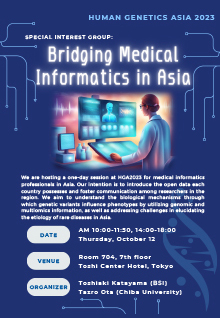
- SIG: Prenatal Dx and Epigenome “Genomic and Epigenomic Analysis for Prenatal and Perinatal Disorders”
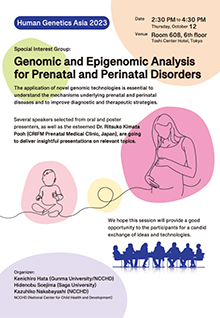
- SIG: Sick neonates seq “Genomic Medicine for Sick Newborn Infants”
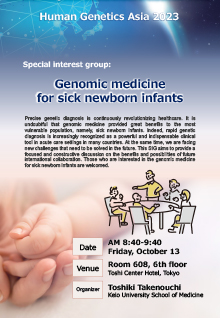
SIG: “Let’s Share Ideas and Opinions on Genetic Counseling!”
Day 1-2: Thursday and Friday, October 12-13, 2023
Thursday, October 12, 10:00am-12:00pm / 2:00pm-4:00pm
Friday, October 13, 9:00am-1:00pm / 4:00pm-5:30pm
705, 7F, Toshi Center Hotel
Moderator:
Junko Yotsumoto (Patient Awareness & Diagnosis, Market Access, Public Affairs & Patient Experience, Japan Pharma Unit, Takeda Pharmaceutical Company / Saitama Medical University / Ochanomizu University)
Overview:
Topics of Each GC SIG:
- Continuing education for genetic counselors: 10/12 10:00am-12:00pm
- EQA (External Quality Assessment) : 10/12 2:00pm-4:00pm
- Supervision : 10/13 9:00am-11:00am
- Case Study with Asian CGC Reviewing fictitious cases together that require ethical considerations 10/13 11:00am-13:00pm
- Asian GC Exchange 10/13 4:00pm-5:30pm
SIG and GC networking in relation to genetic counseling
We have organized a session dedicated to genetic counseling at Human Genetics Asia (HGA2023), which is open to all HGA participants, with the aim of creating a lively exchange of ideas on genetic counseling as well as the exchange of new personnel and research.
The SIG on EQA will be "Brush Up Your Genetic Counseling Skills by Learning EQA (External Quality Assessment)! EQA is a system of educational external evaluation of the entire genetic practice. The lecturers will be Dr. Ros Hastings (Editor of ISCN and Director of GenQA and Oxford University Hospital) and Prof Sandi Dean, Consultant Clinical Scientist and the Director of Genomics Quality Assessment (GenQA), Professor of Clinical Genomics at the University of Edinburgh.
SIG on Continuing education for genetic counselors will provide a forum for the exchange of ideas and opinions on various aspects of post-graduate education for genetic counselors.
Supervision's SIG will include lectures on actual supervision and discussions about supervision. If you are lucky, you may be matched with a supervisor of your choice.
On the SIG of Case Study with Asian CGC: Reviewing fictitious cases together that require ethical considerations, we aim to discuss the differences and similarities between Asia and Japan regarding the ethical aspects of genetic counseling and gain new insights.
Asian GC Exchange : We plan to have participants introduce themselves in a few minutes, on the GC services in their country, the future directions, challenges and how we can collaborate.
GC networking will also be held throughout the two days on the 12th and 13th. The theme will be "No GC (genetic counseling)! No Life!," and communication projects include "Training Schools in Japan and their Friends," "Exchange with male genetic counselors:10/12 4PM-5PM, "Exchange of information on non-clinical CGC work 10/12 4PM-5PM”and "The Senryu Presentation,.
In addition, we plan to offer Japanese snacks and give away novelty items.
Please feel free to stop by, chat, and find your research, clinical and nonclinical colleagues!
*Pre-registration for each GCSIG is preferred, but participants are welcome to attend without registration.
GC SIGs and Networking Working Group
JACGC: Japanese Association of Certified Genetic Counselors
SIG: “Bridging Medical Informatics in Asia”
Day 1: Thursday, October 12, 2023
10:00am-11:50am / 2:00pm-6:00pm
704, 7F, Toshi Center Hotel
Moderator:
Toshiaki Katayama (Database Center for Life Science (DBCLS))
Overview:
Topics
- Introduction to open data related to human genetics from various Asian countries.
- Issues in sharing human genome information and data within the Asian region in the context of international collaborations like GA4GH.
- Exchange ideas among professionals involved in data management and analysis within the Asian region.
- Technical challenges that can be commonly addressed and preparations for hosting the MedHackathon in Asia.
Exchanging ideas and sharing technologies in medical informatics in Asia
We are organizing an one-day session at the Human Genetics Asia (HGA2023) that is open to any HGA participant, aiming to bring together medical informatics professionals from throughout Asia. Our intention is to introduce the open data each country possesses and foster communication among researchers in the region. The primary goal of this meeting is to gather medical informaticians from across Asian countries, cultivating an environment for the exchange of technical knowledge related to data management and analysis in genetics. Given the time constraints and the pioneering nature of this effort in the human genetics community in Asia, our initial focus will be on addressing challenges in scientific research related to genomic and medical information. Additionally, we will discuss the possible approaches to the research use of personal information within the Asian region, in the context of international information-sharing initiatives led primarily by Global Alliance for Genomics and Health (GA4GH).
We aim to understand the biological mechanisms through which genetic variants influence phenotypes by utilizing genomic and multiomics information, as well as addressing challenges in elucidating the etiology of rare diseases in Asia. We hope to move forward, finding potential solutions and establishing a foundation for future collaborations among medical informaticians. If a strong community forms, we will prepare to host a MedHackathon in Asia in the near future. For those unfamiliar with the term "hackathon", it is essentially an intensive coding session where participants collaborate on-site to address cutting-edge challenges. The MedHackathon is envisioned as a week-long retreat-style event focusing on utilizing medical science data, where participants develop software solutions to common problems.
SIG: “Genomic and Epigenomic Analysis for Prenatal and Perinatal Disorders”
Day 1: Thursday, October 12, 2023
2:30pm-5:30pm
608, 6F, Toshi Center Hotel
Moderator:
Kenichiro Hata (Gunma University)
Kazuhiko Nakabayashi (National Center for Child Health and Development)
Hidenobu Soejima (Saga University)
Overview:
We are delighted to announce a two-hour session dedicated to genomic and epigenomic analyses for prenatal and perinatal disorders. This session is open to all HGA2023 participants. Prenatal and perinatal disorders pose formidable challenges to maternal and neonatal health. The application of novel genomic technologies is essential to understand the mechanisms underlying such diseases and to improve diagnostic and therapeutic strategies. Such technologies include deep amplicon sequencing to detect gonadal mosaicism and mitochondrial mutations, exome sequencing, and long-read sequencing for haplotype phasing. Several speakers selected from oral and poster presenters, as well as the esteemed Dr. Ritsuko Kimata Pooh (CRIFM Prenatal Medical Clinic, Japan), are going to deliver insightful presentations on relevant topics. We hope this session will provide a good opportunity to the participants for a candid exchange of ideas and technologies and serve as a starting point for interactions and collaborations among clinical and basic scientists involved in prenatal and perinatal genomics in Asia.
SIG: “Genomic Medicine for Sick Newborn Infants”
Day 2: Friday, October 13, 2023
8:40am-9:40am
608, 6F, Toshi Center Hotel
Moderator:
Toshiki Takenouchi (Keio University)
Overview:
Precise genetic diagnosis is continuously revolutionizing healthcare. It is undoubtful that genomic medicine provided great benefits to the most vulnerable population, namely, sick newborn infants. Indeed, rapid genetic diagnosis is increasingly recognized as a powerful and indispensable clinical tool in acute care settings in many countries. At the same time, we are facing new challenges that need to be solved in the future. This SIG aims to provide a focused and constructive discussion on the benefits and possibilities of future international collaboration. Those who are interested in the genomic medicine for sick newborn infants are welcomed.
GA4GH Satellite Session
Day 2: Friday, October 13, 2023
9:30am-12:00pm
Room F, 3F, Zenkoku Toshi Kaikan
Networking to solve Undiagnosed diseases
Moderators:
Angela Page (GA4H / Broad Institute of MIT and Harvard)
Soichi Ogishima (INGEM / ToMMo, Tohoku University)
Overview:
The Global Alliance for Genomics and Health (GA4GHd) is an international not-for-profit alliance that aims to unlock the power of genomic data to benefit human health. With the goal of expanding responsible, voluntary, and secure genomic data use, GA4GH defines standard methods for data exchange as well as for describing genomic information and associated clinical information. GA4GH also promotes global harmonisation of ethical frameworks and consent procedures for data sharing. In this forum, delegates from GA4GH will review the activities of GA4GH and introduce Australia’s efforts to integrate genomic medicine into healthcare nationally, including implementation of GA4GH standards and international collaborations. We will also introduce some of the nationwide genome-related projects in the Asian region, including Japan, and promote discussion for future cooperation.
*This symposium is partially supported by GA4GH
- Introduction to GA4GH and national initiatives
- Australian Genomics: Outcomes of a 5-year program to accelerate the implementation of genomics into healthcare
- GA4GH-related activities in Japan
- Collaboration opportunities and standards interests of each Asian National Initiative present
- Discussion among all attendees
Networking to solve Undiagnosed diseases
Day 1: Thursday, October 12, 2023
2:00pm-4:40pm
707, 7F, Toshi Center Hotel
Moderator:
Chae Jong Hee (Seoul National University College of Medicine, Korea)
Hisato Suzuki (Tsukuba University, Japan)
Overview:
Research projects to solve undiagnosed patients by performing exome and whole genome analysis are spreading around the world. In this session, researchers from Asian countries will present the current status of their undiagnosed disease programs. The purpose of this session is to share techniques and knowledge that have been useful for diagnosis, to share unresolved cases, and to promote international collaboration.
In this emerging field of human genetics, data sharing is truly essential.
Let's meet and get to know each other personally!
2:00pm-2:15pm Opening remarks:
Helene & Mikk Cederroth from Wilhelm Foundation
2:15pm-2:55pm Sharing Asian experiences
3:00pm-3:30pm Sharing new findings, technology, and unsolved cases
3:30pm-3:45pm Discussion and Networking
3:45pm-3:50pm Closing remarks

